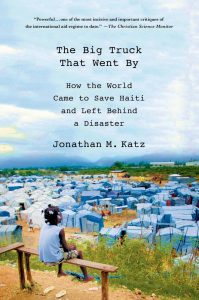 The Big Truck That Went By: How the World Came to Save Haiti and Left Behind a Disaster
The Big Truck That Went By: How the World Came to Save Haiti and Left Behind a Disaster
By Jonathan M. Katz
Why I Chose This Book
I picked up this book after having a conversation with my dad about international aid, development, and how voluntourism is actually not that great of a thing. He told be about a friend he had who did some volunteer work in Haiti after the earthquake, and came back telling his friends about how lazy and entitled he thought the Haitian people were. Apparently he was helping build wells, and was not impressed with the locals' assistance. I knew the issue had to be more complex than that.
Basically, it's about…
Katz is a journalist about to ship out after quite a long stint in Haiti, when disaster literally strikes. He finds himself now navigating a post-earthquake Haiti and is the only foreign journalist in town able to send report during the inital aftermath, and does his best to fulfill his journalistic duties while dealing with the horrors before him. The thing is, Haiti was possibly one of the worst places in the world for an earthquake to strike. After a long history of colonialism, corruption, and unfair international intervention, they were already set up for failure in the wake of the earthquake, and the road to recovery was long and difficult. Katz uses this book as an outlet to narrate both his experience as a foreing correspondent in Haiti, to illustrate the history of Haiti leading up to this fateful day, and to examine how the influx of itnernational humanitarian aid either helped or hurt Haiti in the long run.
I had just finished Chasing Chaos by Jessica Alexander, and while her story of international humanitarian aid left off in Haiti, this one picked up; they were definitely great books to read back-to-back to really understand some of these fundamental issues in our aid system. While this book, The Big Truck That Went By, wasn't my favorite, it was definitely a great introduction to Haitian issues and provides a great example of how international systems designed to help are often failing the most vulerable among us, in the name of government and corporate greed and power–a problem that unforunately is not unique to Haiti.
